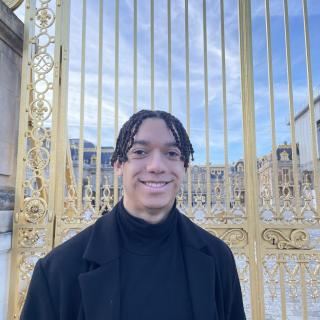While studying abroad, Jay Lauf (IES Abroad Durham 1984-85 | Connecticut College) traveled extensively, visiting Berlin and what was then the Soviet Union. During these travels, he discovered that people around the world had more shared values than they did differences. Jay carried open-mindedness and respect for other cultures that he cultivated abroad into his professional life—from interacting with global importers while working in ad sales to leading teams at Wired magazine to working as publisher of The Atlantic during its digital transformation. Today, Jay is co-CEO of Quartz, a global digital news site with more than 100 journalists on five continents.
Read on as Jay shares his professional journey in journalism, the inspiration behind Quartz, and how lessons he learned abroad have impacted him every step of the way.
IES Abroad: As an undergrad at Connecticut College, what led you to study abroad in Durham?
Jay Lauf (JL): Connecticut College encouraged study abroad programs, and as an English and History major, I was particularly interested in exploring England. I remember distinctly choosing Durham not only because of its excellent academic reputation, but also because the program was a full year and was far outside London. My thought was I would have a more profound understanding of the place if I was outside a major international city that may have more in common with New York than other parts of the UK, and that a single semester wasn't enough time to really immerse.
IES Abroad: How did your experiences studying abroad in England shape your thinking going forward?
JL: I traveled pretty extensively through Europe during that year, including to Berlin while the Wall was still up and to what was then the Soviet Union. That, coupled with getting to know people from all over the UK, gave me an appreciation for how similar people are everywhere in the world. At its most basic level, we all want the same things—a happy, healthy, peaceful life. It made me realize we have more in common than we have differences.
IES Abroad: Where did your career take you after graduating? How did the skills you developed abroad come into play?
JL: I wanted to get into journalism and so I moved to Washington, DC, with some fellow Connecticut College friends. It was pre-Internet and my family had no real connections in the business, so I spent two jobless weeks pounding the pavement looking for any publisher who would take me. I finally landed a junior editing and assistant job at B'nai B'rith's Jewish Monthly. I eventually couldn't make ends meet with a junior journalism job and had to move home when I ran out of money. I struggled to find writing work back then, but stumbled on a media owner who asked if I'd try ad sales and I figured I'd do that, save some money, and then go back to pursuing writing.
It turned out I was good at it, and I was accelerated into management at a pretty young age. That job did not involve any international travel, but my customers were importers from all over the world—India, China, Pakistan, Korea, Europe, and Africa—and my experience with other cultures certainly helped me stand out as a young American who understood that there are different cultural norms, but that again, we all had similar objectives.
Eventually, I landed at WIRED magazine, and, since then, my work has taken me abroad again—the open-mindedness and respect for other cultures that I developed at Durham have helped me immensely.
IES Abroad: Today, you are co-CEO of Quartz, a global digital news site founded in 2012. What inspired the launch of the site?
JL: We saw that the media consumption habits of most people around the world were changing—and particularly so for a new generation of business leaders who were starved for time and increasingly consuming media on mobile devices. That and the habit of visiting a publisher’s homepage directly was being abandoned as people waded in and out of social media and email streams all day, the new starting point for finding content to consume. Meanwhile, most traditional publishers were still very print-centric in their business models and product design, and we saw there was a window open to build high quality journalistic content made for mobile devices first.
IES Abroad: Tell us about Quartz. What makes the platform unique?
JL: Quartz is a digitally native news platform that's designed to be a guide to the new global economy for people who are excited by change. So we're trying to serve innovative business people all over the world by providing bracingly intelligent insight into what is driving the global economy and what will shape it in the years to come. The things that make us particularly unique are our approach to journalism, product development, and advertising. To be brief, we have more than 100 journalists on five continents. Together they speak more than 40 languages fluently and have reported from 115 countries across their careers—most hail from places like BBC, The Economist, The New York Times,The Wall Street Journal, Reuters, and the like, so it's high-quality work.
But we approach our journalism completely differently by focusing on what we call "obsessions" instead of "beats"—this allows us to remain highly relevant and topical. On the product side, we focus on user-experience in mobile to invent all kinds of simple, elegant, and delightful expressions of our work from interactive email to rich data visualizations to AR and chatbots—all native to mobile, so easy to use and phone-friendly.
Lastly, we've reinvented the way to approach high-quality advertisers. We have never worked with an ad network, run a banner ad, or had one of those annoying pop-up ads that interrupts your experience and urges you to install an ad-blocker. Instead, we deploy the same elegant product-development ethos to our advertising and have become a leader in high-quality advertising. More than 500 blue chip companies from around the world advertise with Quartz.
IES Abroad: As the media landscape changes, what is your vision for Quartz in the future?
JL: We aim to be the first thing a business professional anywhere in the world clicks on when they get up in the morning. Back in November, we launched a new app that is designed to be a community platform for these people to share and comment on important news in a much more sophisticated and useful way than they are currently experiencing with social media. We have luminaries like Sir Richard Branson, Kristalina Georgieva, and more than 70 others who have signed on as "Quartz Pros" to help us set the bar. So in terms of the changing landscape, we think global citizens are hungry for a place to engage more meaningfully with the news and each other and that Quartz will be that place for them.
IES Abroad: What advice would you give for students considering studying abroad or interning?
JL: My advice for students going abroad is to not get trapped into the social circles that are comprised only of people from your home country. Do your best to be in situations in which you can assimilate more and be a part of the host country's community. You'll learn more and be more richly rewarded. I also think my decision to go abroad for a year was a good one because it took me deeper into the culture and afforded me more time and chances to travel elsewhere. Not everyone has that luxury or mindset, but I would certainly advocate considering it.
Learn more about studying abroad in England, and check out all of our Alum of the Month profiles to see real examples of how study abroad changed the lives and careers of our former students. Give more students the opportunity to study abroad by supporting scholarships.





